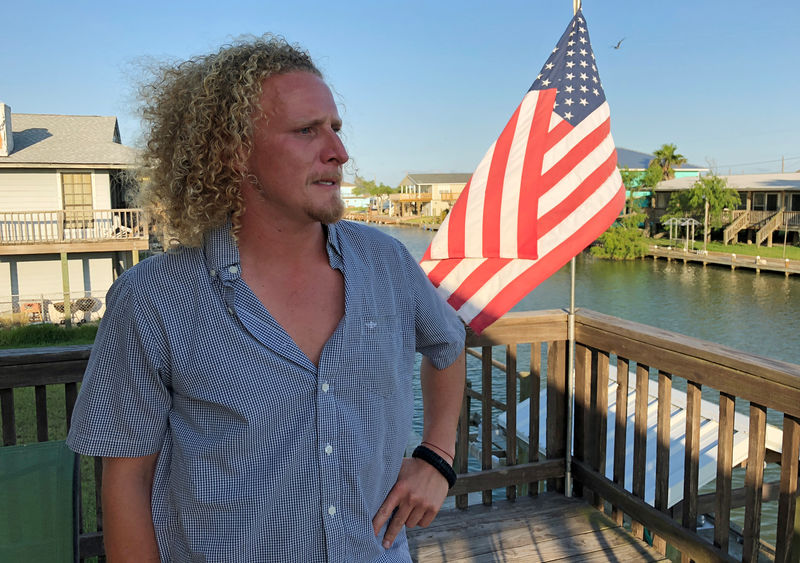 © Reuters. Dearing, who became a local hero for being an impromptu leader of an evacuation center during Hurricane Harvey last year, speaks during an interview in Rockport
© Reuters. Dearing, who became a local hero for being an impromptu leader of an evacuation center during Hurricane Harvey last year, speaks during an interview in RockportBy Jon Herskovitz
ROCKPORT, Texas (Reuters) – Destroyed houses still dot Zachary Dearing’s neighborhood in the Texas coastal city of Rockport, a reminder of last year’s devastation from Hurricane Harvey and a warning about what could lie ahead for such communities in the new hurricane season.
Dearing, a 30-year-old harbor worker and aspiring screenwriter, was trapped in a local storm shelter during Harvey last August and was later hailed as a hero for leading care for about 120 people.
Dearing still has the Texas state flag that flew at the Capitol given to him by lawmakers in appreciation. He and his neighbors also still bear the psychological scars from the Category 4 storm that leveled the city of about 10,000 people and killed two residents during what ultimately became the most destructive U.S. hurricane season on record.
“You look around Rockport, obviously we are still in recovery, we are still rebuilding. But emotionally, the storm is not over for a lot of us,” he said.
With this year’s hurricane season beginning on Friday, people like Dearing are bracing for another round.
During Harvey, Dearing evacuated to a shelter at local elementary school, where he found vulnerable citizens unwilling or unable to leave the area and no supplies or management to help them.
Dearing responded by building a team of younger volunteers who cared for the evacuees, including six people on oxygen and about 20 elderly in wheelchairs. They collected leaking water in containers they found and used them to refill the few operational toilets, pooled food and even braved the high winds to find a car they could use to recharge a portable oxygen machine.
Rockport’s pain last year was just the start, however. In addition to Texas, hurricanes walloped such places as Florida and Puerto Rico, causing scores of deaths, hundreds of billions of dollars in damage, massive power outages and devastation to hundreds of thousands of structures.
Brock Long, an administrator for the Federal Emergency Management Agency, said on Wednesday at the National Hurricane Center in Miami that the fallout from last year is still being felt.
“We’ve helped more people in the past six months than the agency has dealt with over the last decade,” he told reporters of the about five million people who registered for FEMA benefits.
U.S. forecasters expect the 2018 Atlantic hurricane season will be near- to above-normal in number and intensity of storms, the National Oceanic and Atmospheric Administration’s (NOAA) Climate Prediction Center said in May.
The forecasters estimate between one and four major hurricanes, packing winds of 111 miles per hour (178.6 kph), could develop this season. About half of the 10 to 16 named storms will be hurricane strength with winds of at least 74 mph (119 kph).
It has been almost nine months since Harvey dumped nearly a trillion gallons (3.8 trillion liters) of water on the U.S. Gulf Coast, killing 68 people and causing an estimated $125 billion in property damage.
About 18,000 people in Texas remain in temporary housing a year after the storm, down from some 61,000, John Sharp, the head of the commission to rebuild Texas told state lawmakers this month.
After Harvey, Houston passed an ordinance requiring certain dwellings to be raised to the floodplain for the highest flood levels in 500 years to plus two feet (61 cm) as Harvey was the city’s fifth 500-year flood since 2010. Previously, the rule was new homes only had to start one foot (30 cm) above the 100-year level.
While most of Harvey’s damage in Texas in dollar terms was in the Houston area, the impact of the devastation was far more concentrated in Rockport, about 180 miles (290 km) to the southwest.
Hundreds of Rockport buildings are still in disrepair, including City Hall, which is boarded up from the damage, with city officials now working out of a separate municipal structure that survived.
Rockport Mayor Patrick Rios said the top priority now is bringing back affordable housing for residents, many of whom lost their homes after the hurricane pounded the city with winds of about 130 miles per hour (210 kph) and storm surges of up to 13 feet (4 meters).
For Dearing, the flag and a plaque were given in recognition for his heroism, and he met all five living former U.S. presidents at a subsequent hurricane relief concert. He also learned about himself during Harvey.
“I learned I can carry a lot of weight, a lot more weight than I thought. If you have to find it, you always have a little bit more in you than you think you do,” he said, from Rockport where he remains in the Aransas County Navigation District job he had before the hurricane.
Crystal Whitehead, one of the people who survived in the shelter, praised Dearing’s efforts after she lost her house and suffered broken ribs in the storm.
“I am thankful for what Zach did for Rockport. He was there for all of us,” she said.
As for lessons Dearing can apply in this year’s hurricane season, he said he will encourage people to get out of town “fast and far” when they hear a storm is coming.
“You need to get to know your neighbors. In a time of crisis, you’re going to come to rely on one another,” he said. “Everyone has a role to play.”
Source: Investing.com



























